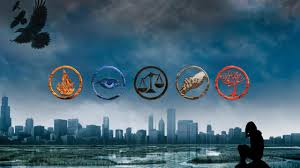Guest contributor Jordan Smith can be found online at http://www.jordanthomassmith.com and he invites you to come on by!

The Divergent series is storming the publishing world and soon the film adaptations of those novels will likely storm the world of movies. For those who don’t know, this YA series by Veronica Roth focuses on a near-future society where 16 year olds are required to take a standardized test, the results from which will be used to place them into one of five rigidly construed category-groups. This is on the heels of The Hunger Games, another YA series about forcing some young adults into gladiatorial games most don’t want to do, and a rigidly enforced geo-economic caste system. These two series alone count millions of young adults in their devoted fan bases, and countless other books with overlapping themes have made YA-dystopia one of the most widely read subgenres in modern fiction. Maybe there’s something about today’s young adults that makes them really identify with the dystopian subgenre, or maybe young adults in any modern era can identify with dystopian stories.
I understand why when I recoall my own young, or younger adult years. I’ve just turned 30, which makes me a graying, out of it fogie in the eyes of today’s young adults, and a wet behind the ears pup to those middle aged or older. But alas, this means I can still recall well my young adult years, but have some distance from them now that gives me a bit of perspective. I remember that in the high school years of my young adulthood it really felt at times like the entire world was turning against me. Most of the time I had a teacher mad about a test or project I had dropped the ball on, peers exerting their various pressures, parents insisting on certain limits or expectations, siblings I was still sharing a room with, sometimes a job to attend to. Meanwhile I was supposed to be making decisions on my future plans, just little choices like what I was going to do with the rest of my life. Besides having some pressures as a young adult, you’re legally required until age 16 to report on most week days to a local government building with many rules and a structure to your day you’ll have limited influence over. If you’re 16 or over you have a legal right to not attend, but practically speaking you’ll probably have no choice but to keep doing so, given expectations of parents, your own future plans, etc. Thinking about all of this can easily cause one to start resenting authority, especially authority in an abstract form like what the government will be in the future.
I know now that the pressures I faced in young adulthood were nothing compared to some of the adversities people have endured in the larger world. Of course many young adults really do face extremely difficult things. Even in the halls of affluent suburban high schools there can be extreme bullying, the occasional oppressive teacher or principal. There can be toxic parents in the homes of posh gated communities. But this being said, in your young adulthood many lesser challenges can seem so unfair, final in their consequences and significant to the world, when later in life you realize they were none of those things. No wonder young adults with identify with Katniss Everdene having to fight in life and death combat as the world watches. They don’t yet realize that what happens in young adulthood academically, socially, extracurricular wise, etc., mostly will neither limit nor guarantee much about your future. The rest of the world probably doesn’t care either way about the challenges you faced most of the time.
But although us older(ish) people could follow this reasoning to a conclusion of writing off these feelings of young adults as so much melodrama and self-importance, we should consider that we have something to learn from their perspective, as any generation has to learn from the perspective of any other generation. After all, young adults often still have some idealism in their thinking; while they may have felt pressures in their own lives they often haven’t seen how efforts to change the larger world can blow up in the face of those trying to do the right thing. Or seen how elusive it can be to even determine what the ‘right’ thing is sometimes. Not having been burned in these ways, young adults often still have a strain of idealism which helps them articulate better than most the way things ought to be in society. Knowing how things ought to be helps them also understand how things shouldn’t be, and therefore to connect with that when it’s conveyed in dystopia. If we dialogue with young adults as equals we can hear them recapitulate to us the way things ought to be, things that were once important to us too. Their yearnings may bolster our own latent idealist leanings, and give us a renewed sense of the ways in which progress may be possible in our world, and therefore worth pursuing. There’s nothing that can renew a sense of energy like new allies coming into the fold.
The young adults have to meet us halfway though, and listen when we say how most of what they face now isn’t final (good news for them usually), how some things you never think can make sense can come right into focus if you’re suddenly put in a position you‘ve never been in before, and how the best intended idealism can have the most serious unintended consequences, even for those you were trying to help.
I enjoyed your perspective, and as the parent of a 13 year old, I frequently spend time thinking back to my own adolescence in an effort to try to figure out what’s going on in his head! 🙂
Thanks Dawn. I’m glad to offer it.